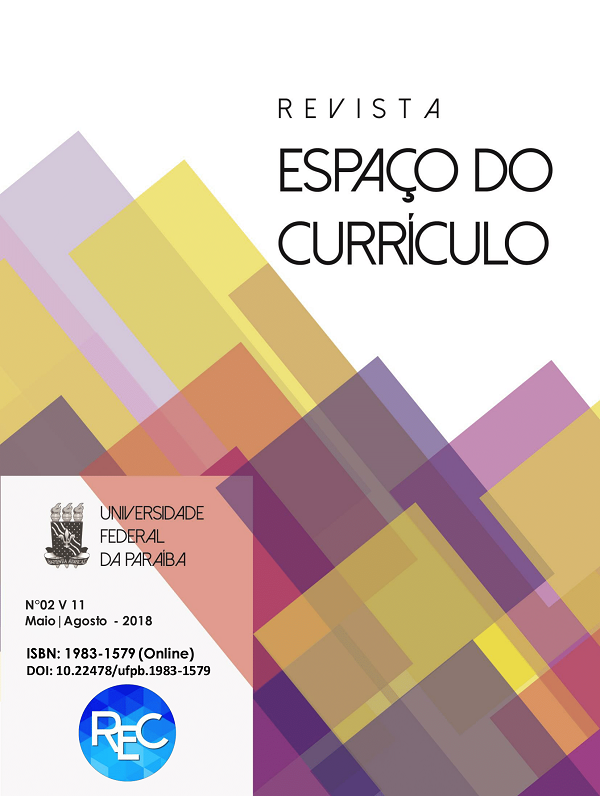CURRICULUM IN THE EDUCATION OF YOUTH AND ADULTS FROM THE FUNDAMENTALS OF THE HISTORICAL CULTURAL APPROACH
DOI:
https://doi.org/10.22478/ufpb.1983-1579.2018v2n11.39559Keywords:
Curriculum, Youth and adult education, Historical-cultural ApproachAbstract
We intend to contribute with a set of studies that have been oriented to deepen the importance of the development of the school curriculum, based on solid theoretical foundations that enable students to access the human cultural heritage. We perceive in the curricula the hegemony of tacit knowledge, and the emphasis on everyday life, to the detriment of scientific knowledge, which culminates in the devaluation of the social function that the school fulfills as a privileged "locus" of access to students, knowledge, especially with the working class. . We aim to evidence assumptions of the Historical-Cultural Approach that serve as a starting point to help organize a curriculum for the training of young people and adults, which in practice meets the educational needs of this public, which for various reasons have historically been excluded from access to school. Therefore, it is necessary to reflect on the particularities of the development process in these stages of life, as well as to consider the contradictions that arise in this type of teaching, together with the historical challenges of capitalist society. It is important to highlight that understanding the social practice of these subjects, based on the intentionality of educational work, based on scientific concepts that are directly and indirectly linked to the complexity of higher psychic functions, also requires an understanding of the periodization of dominant activities in. each period of life, as the guiding thread of this work.
Downloads
Metrics
References
BRASIL. Lei de Diretrizes e Bases da Educação Nacional. Lei Nº 9394, de 26 de dezembro de 1996. Brasília, 1996.
BRASIL. Conselho Nacional de Educação. Parecer CNE/CEB nº 11/2001 e Resolução CNE/CBE nº 1/2000. Diretrizes Curriculares para a Educação de Jovens e Adultos. Brasília: MEC, maio 2000.
COLECTIVO DE AUTORES. Investigaciones acerca de la formación de las nuevas generaciones. Editora Universitaria. Universidad de La Habana. La Habana, Cuba, 1990.
DAVIDOV, V. V. La enseñanza escolar y el desarrollo psíquico. Editorial Progreso. Moscú., 1988.
DAVIDOV, V. V. Análisis de los principios didácticos de la escuela tradicional y posibles principios de enseñanza en el futuro próximo. En: SHUARE, Marta (Org.). La psicología evolutiva y pedagógica en la URSS. Antología. Editorial Progreso. Moscú, p.143-154, 1987.
DOMÍNGUEZ GARCÍA, L. Psicología del desarrollo. Problemas, principios y categorías. Editorial “Félix Varela”. La Habana, Cuba, 2007.
DAVIDOV, V. V. Tipos de generalización en la enseñanza. Editorial Pueblo y Educación. La Habana, Cuba, 1981
DUARTE, N. Concepções afirmativas e negativas sobre o ato de ensinar. Cadernos CEDES, Campinas, v.19, n.44, Abr. 1998.
DUARTE, N. Os conteúdos escolares e a ressureição dos mortos. Contribuição à teoria histórico-crítica do currículo. Campinas: Autores Associados, 2016.
ELKONIN, D. B. Sobre el problema de la periodización del desarrollo en la infancia. En: SHUARE, Marta (Org.). La psicología evolutiva y pedagógica en la URSS. Antología. Editorial Progreso. Moscú, p.104-124, 1987.
FACCI, M. G. Dias; TULESKI, S. C. Da apropriação da cultura ao processo de humanização: o desenvolvimento das funções psicológicas superiores. In: Anais do II Encontro Brasileiro de Estudos Marxistas (EBEM). Curitiba–PR: agosto, 2006.
GALPERIN, P. Ya. Sobre la investigación del desarrollo intelectual del niño. En: SHUARE, Marta (Org.). La psicología evolutiva y pedagógica en la URSS. Antología. Editorial Progreso. Moscú, p.124-142, 1987.
GALPERIN, P. Ya. Introducción a la psicología. Editorial Pueblo y Educación. La Habana, Cuba, 1982.
KOSTIUK, G. S. El principio del desarrollo en la psicología. En: ILIASOV, I.I.; LIAUDIS, V. Ya. (Orgs). Antología de la psicología pedagógica y de las edades. La Habana: Editorial Pueblo y Educación, 1986, p.20-28, 1987.
PODDIAKOV, N. Sobre el problema del desarrollo del pensamiento en los preescolares. En: SHUARE, Marta (Org.). La psicología evolutiva y pedagógica en la URSS. Antología. Editorial Progreso. Moscú, 1987.
SAVIANI, D. Pedagogia histórico-crítica: primeiras aproximações. 9. ed. Campinas: Autores Associados, 2005.
VENGUER, L. A. La relación entre la educación y el desarrollo. En: LÓPEZ HURTADO, Josefina; DURÁN GONDAR, Berta (Orgs.). Superación para profesores de Psicología. Editorial Pueblo y Educación. La Habana, Cuba, p. 125-140, 1975.
VYGOTSKI, L. S. El desarrollo de las funciones psíquicas superior. Editorial Científico Técnica. La Habana, Cuba, 1987.
Downloads
Published
How to Cite
Issue
Section
License
By submitting an article to Curriculum Space Journal (CSJ) and having it approved, the authors agree to assign, without remuneration, the following rights to Curriculum Space Journal: first publication rights and permission for CSJ to redistribute this article. article and its metadata to the indexing and reference services that its editors deem appropriate.
















